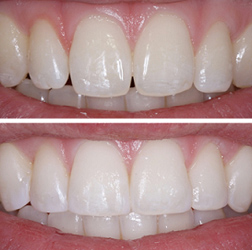Get the Perfect Smile With Composite Bonding

What Is Cosmetic Bonding?
Composite bonding, also known as dental bonding is a cosmetic dental procedure that involves applying a tooth-colored composite resin material to your teeth to enhance their natural appearance, fix minor cosmetic issues like cracks, and protect your smile from decay. Composite bonding is a painless procedure, and the results can last up to 7 to 10 years with proper care and maintenance.
Benefits of Composite Bonding
Composite bonding offers numerous benefits, such as:
- Quick & Convenient – Composite bonding is a quick and convenient procedure that can be completed in a single visit.
- Non-Invasive – Unlike other cosmetic procedures like veneers or crowns, composite bonding does not require removing much of your tooth enamel.
- Aesthetically pleasing – The tooth-colored composite resin material used in bonding is made to blend with the natural shade of your teeth for a seamless finish.
- Versatile – Composite bonding can correct a wide range of dental flaws such as chips, cracks, gaps, and discoloration.
- Cost-Effective – Composite bonding is a cost-effective alternative to other cosmetic procedures.
Composite Bonding Procedure
The composite bonding process can be completed in just a single visit by Dr. Shlafer at our Farmington Hills practice. Your dentist will first prepare the tooth’s surface by roughening it and applying a conditioning liquid.
Next, the composite material is applied to the tooth in layers and shaped to match the surrounding teeth. A special light is used to harden each layer of the composite material. After the final layer is applied and hardened, the dentist will polish and shape the tooth to achieve a natural-looking finish and a stunning new smile.
Frequently Asked Questions
No, composite bonding is not a painful procedure. Your dentist may use a local anesthetic to numb the area, but most patients do not experience any discomfort during the procedure. After the procedure, you may experience some sensitivity or discomfort, but this can be managed with over-the-counter pain relievers and should subside within a few days.
Yes, you can eat and drink normally after composite bonding. However, your dentist may recommend that you avoid hard, crunchy, or sticky foods for the first few days after the procedure to prevent damage to the bonding material. You should also avoid consuming foods and drinks that are known to stain teeth, such as coffee, tea, and red wine, as the composite material can be prone to staining.
While composite bonding can fix a variety of cosmetic dental issues, it may not be suitable for all cases. Your dentist can evaluate your teeth and recommend the best treatment option for your specific needs.



